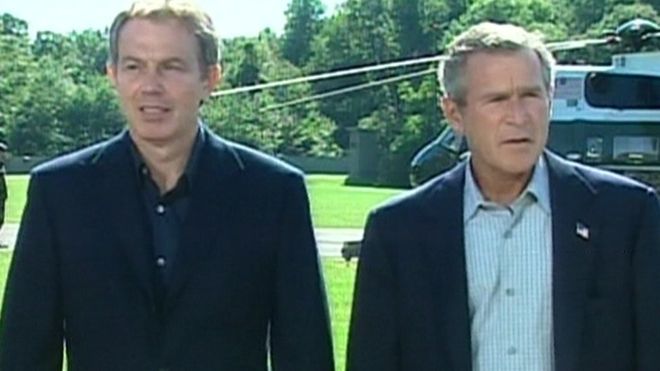Chilcot report: US ‘pushed UK into Iraq War too early’, says ex-ambassador

The US pushed the UK into military action in Iraq "too early", a former British ambassador to the UN has said in the wake of the Chilcot report.
The long-awaited report said ex-Prime Minister Tony Blair had overstated the threat posed by Saddam Hussein — and military action was not a last resort.
Sir Jeremy Greenstock, UK ambassador to the UN in 2003, said Mr Blair had wanted a UN resolution backing action.
But he told the BBC senior US officials thought it was a "waste of time".
The Chilcot report was published on Wednesday having taken seven years to compile.
Sir John Chilcot — chairman of the the UK's Iraq War inquiry — concluded Mr Blair had sent ill-prepared troops into battle and had "wholly inadequate" plans for the aftermath.
The 2003 invasion had not been the "last resort" action presented to MPs and the public, he said, adding that there had been no "imminent threat" from Saddam Hussein, and the intelligence case was "not justified".
Sir Jeremy said he felt Mr Blair had wanted to wait longer before taking military action.
It would have been "much safer" to give weapons inspectors in Iraq another six months to continue their work, he added.
"I felt that at the time, the British felt it at the time, I think the prime minister felt it at the time, that the Americans pushed us into going into military action too early," he told BBC Radio 4's The World Tonight.
Mr Blair had wanted to secure a UN resolution before the conflict but US officials were not committed to a resolution, he added.
"The Americans weren't genuine about it — but the prime minister was genuine about it — because he thought there was a chance that Saddam could be made to back down before we had to use military force.
"And George Bush for a while agreed with him. But other people behind George Bush didn't agree with him and thought it was a waste of time."
General Tim Cross — the most senior British officer involved in planning the war — said former US defence secretary, Donald Rumsfeld, would not listen either to the UN or the UK about the aftermath of the invasion.
He said the US dismantled the Iraqi army and the ruling Ba'ath party without consultation.
However, the US administrator to Iraq at the time, Paul Bremer, told the BBC's Newsnight that British officials had been thoroughly briefed on the strategy for dealing with the Ba'ath party.
"That particular decision was approved by the president of the United States, the secretary of defence, by the joint chiefs of staff of the United States.
"It was previously discussed by my national security adviser with authorities in London 10 days before it was issued — he received no objections," he added.
Following the publication of the report, Mr Blair said he took responsibility for "mistakes in planning and process" identified by the inquiry.
He said he felt "more sorrow, regret and apology than you may ever know" for the grief of those whose loved ones died.
But he insisted he could look the families in the eye — and the nation — and state that he did not mislead anyone over the invasion, the service personnel did not die in vain, and he was right to do what he did.
A spokesman for some of the families of the 179 British service personnel and civilians killed in Iraq between 2003 and 2009 said their loved ones had died "unnecessarily and without just cause and purpose".
He said all options were being considered, including asking those responsible for the failures identified in the report to "answer for their actions in the courts if such process is found to be viable".
Prime Minister David Cameron, who voted for war in 2003, told MPs it was important to "really learn the lessons for the future" and to improve the workings of government and how it treats legal advice.
Labour leader Jeremy Corbyn — who voted against military action — said the report proved the Iraq War had been an "act of military aggression launched on a false pretext", something he said which has "long been regarded as illegal by the overwhelming weight of international opinion".
Политика конфиденциальности | Правила пользования сайтом








